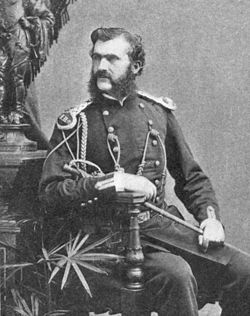Richard Henry Savage
| Richard Henry Savage | |
|---|---|

Richard Henry Savage
|
|
| Born |
June 12, 1846 Utica, New York |
| Died | November 11, 1903 (aged 57) New York City |
| Place of burial | West Point Cemetery |
| Allegiance |
|
| Service/branch |
United States Army Egyptian Army California National Guard |
| Years of service | 1868–70, 1871–72, 1877–79, 1898–99 |
| Rank |
Captain, Egyptian Army Major, U.S. Army Colonel, National Guard |
| Battles/wars | Spanish–American War |
| Other work | Author, Diplomat, Engineer, Attorney |
Richard Henry Savage (June 12, 1846 – October 11, 1903) was an American military officer and author who wrote more than 40 books of adventure and mystery, based loosely on his own experiences. Savage's eloquent, witty, dashing and daring life may have been the inspiration for the pulp novel character Doc Savage.
In his youth in San Francisco, Savage studied engineering and law, and graduated from the United States Military Academy. After a few years of surveying work with the Army Corps of Engineers, Savage went to Rome as an envoy following which he sailed to Egypt to serve a stint with the Egyptian Army. Returning home, Savage was assigned to assess border disputes between the U.S. and Mexico, and he performed railroad survey work in Texas. In Washington D.C., he courted and married a widowed noblewoman from Germany.
Savage returned to San Francisco with his wife to stay for ten years, raising a daughter and taking part in a family business. He served at the rank of colonel in the California National Guard, and took part in the social activity of the city. During a period of anti-Chinese race riots, Savage stood up for law and order, and thereby gained the respect of San Francisco's leaders, property holders and middle class residents. Savage traveled to many exotic lands but in 1890 he was struck with jungle fever in Honduras. While recuperating in New York state he wrote his first book: My Official Wife. This very successful action-and-adventure story was followed by more, at the rate of about three per year, written for the general public rather than for literary critics; the latter were charmed by the first book but scathing of many later ones. Savage lived primarily in New York City, and was involved in lawsuits, especially against his New York publisher regarding unpaid royalties.
When the Spanish–American War broke out, Savage volunteered to lead men in battle. Instead, he was given command of an engineering unit which then built a complete base in Havana. Returning to New York, he wrote more books and corresponded with his wife who traveled often to the Russian Empire to visit their daughter and her Russian husband. Four years after mustering out of the Army, Savage was knocked down and mortally wounded at the age of 57 by a horse and carriage on the streets of New York.
...
Wikipedia
